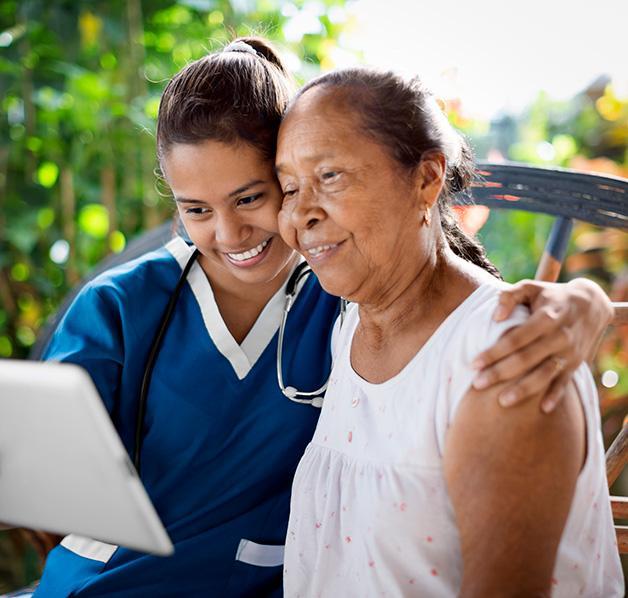In the traditional model, once authenticated, a user receives all secure data. ABE enables moving beyond that “all or nothing” model so that policies rather than individuals determine access. That could mean, in practice, that a doctor reviews health records, the hospital business office looks at insurance data, and insurance companies see something else.
PERSONAL
DATA
in
today’s
digital
economy
As people look for new ways to participate in their health and wellbeing journey, technologies and digital innovations provide the means for improvements. As we shift away from ‘healthcare’ and move towards a lifelong holistic outlook, technologies play an essential role in supporting a more proactive approach. Below we explore some of the most promising innovations shifting us towards a more human-friendly, trustworthy, knowledge-driven, and technology-enabled world of health and wellbeing.

DATA FOR GOOD
The digital era has transformed consumers into new kinds of producers. In addition to buying goods and services, we are also at the same time producing a resource, namely: data about ourselves that can be taken, traded, and exploited. In a previous age, information about individuals was limited to names, addresses and basic demographics. Today a rich and extensive amount of information follows in the wake of our daily actions.
In exchange for digital tools or online retail opportunities, we often exchange rights to information about us as a result. In some cases, we explicitly offer something, such as an email address, in return for something else, such as sales discounts. More often, the exchange results from our default acceptance of detailed and typically unread policies that give organizations access to our digital fingerprint and even allow for selling it to third parties.
The data we produce not only represents online activities. Health trackers generate information about our heart rate, steps taken and other physiological processes. In the future, our digital fingerprint will likely include genetic data. Altogether, this trove will grow in value. Not only will businesses want to trade it, but bad actors will be increasingly interested in stealing it, especially when linked to financial data, bank accounts or credit cards.
TRUST BY DESIGN
Cyberthreats targeting software companies have risen, for instance, and others have recognized that this aspect of the digital economy is out of balance. One figure who has taken steps to repair the structural damage to trust is Tim Berners-Lee, the computer scientist who created the standards that underpin the World Wide Web.
In 2015, Berners-Lee launched a web decentralization initiative called the Social Linked Data or “Solid” Project at the Massachusetts Institute of Technology (MIT) to enable “true data ownership as well as improved privacy.” Solid specifications detail how to create “pods,” or personal online data stores, to control which people and applications can access the data. Berners-Lee then founded a venture based on Solid technology named Inrupt. This “trust by design” approach makes end-user control integral, not additive, or reactive.
The EU’s General Data Protection Regulation (GDPR), passed in 2016 and implemented two years later, is an example of redressing through legal means the control that individuals have over their personal data. The California Consumer Privacy Act (CCPA), passed in 2018, likewise provided individuals with more access to and rights concerning their personal data.
A development in cryptography is also set to impact the way we preserve privacy and share data. First proposed in a 2005 paper co-authored by Brent Waters, a senior scientist in the NTT Research Cryptography & Information Security (CIS) Lab, attribute-based encryption (ABE) is gaining steam. The European standards organization (ETSI) has released two specifications that codify high-level requirements for applying ABE to personally identifiable information and personal data protection.


Sharable by Design
Data needs to be shared but in the right ways. A human-centric model regards the original data owners, not as patients, lab trial subjects or sources of pharmaceutical revenue, but as individuals who are, for the most part, well and want to become more so.
Health insurance companies are moving in this direction. Some have made it easier for customers to share relevant wellness information, such as exercise data, and incentivize this practice through rebates or discounts. Health care providers are also expanding their focus from sickness to health. In 2020, for instance, the non-profit integrated health system Adventist Health purchased Blue Zones, a pioneer in taking a systematic and environmental approach to improving the health of cities and communities.
The NTT envisioned health and wellbeing ecosystem model includes food and nutrition, fitness and wellness, mindfulness and stress reduction, and social support. Like Blue Zones projects that have seen measurable improvements in healthy lifestyles and corresponding decreases in healthcare costs, this model aims to leverage data in mutually acceptable ways to achieve common goals.
Collaborative Model
Today’s data-driven economy demands the rebuilding of trust through improved transparency and user-friendliness. In collaboration with organizations, governments, institutions and businesses, these efforts will usher in an improved health and wellbeing model, shifting from simply taking data from individuals to using it with them on their behalf.

